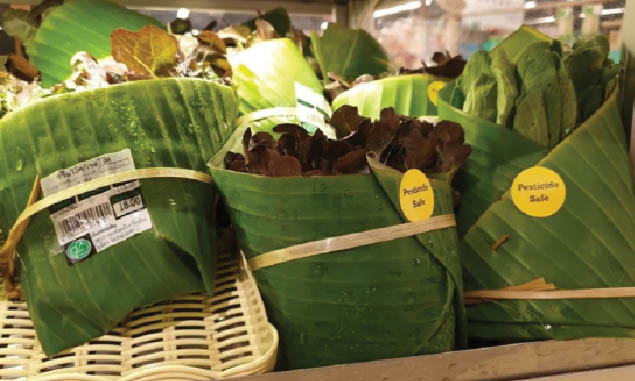Plastic bag ban: Do banana leaves hold the solution?
Indiscriminate use of plastic bags across the world has become a major concern to environmentalists considering the danger plastic poses to human and aquatic life. Effort is being made by some countries to ban its use and switch to degradable materials. Experts say plastic bags are non-biodegradable and hazardously disrupt the ecological balance, and water […]

Indiscriminate use of plastic bags across the world has become a major concern to environmentalists considering the danger plastic poses to human and aquatic life.
Effort is being made by some countries to ban its use and switch to degradable materials.
Experts say plastic bags are non-biodegradable and hazardously disrupt the ecological balance, and water pollution and emit dioxins into food whenever they are left in a humid environment or burnt.
According to the United Nations (UN), if global plastic consumption continues at the current rate, there will be 12 trillion tonnes of plastic in landfills and the environment by 2050, it said only nine per cent of plastics had actually been recycled.

While the global community sees the need to phase out plastic bags to adopt paper bags that are eco-friendly, some countries have gone ahead to develop other alternatives.
Recently, a report appeared on Facebook on how Thailand has replaced plastic with banana leaves. The report showed pictures of produce wrapped in banana leaves in Rimping Supermarket in Chiang Mai, Thailand.
According to the report, other shops have reportedly switched to banana leaves for packaging as well, as they are cheaper and more reliable.
Countries that have banned the use of plastic bags include Rwanda, Morocco, Taiwan, New Delhi, France, Montreal and Kenya.
These countries are making effort to reduce the pollution of plastic, while nothing has yet been done in Nigeria. Over the years, successive administrations vowed to outlaw the use of plastic bags and bottles, but this has remained in the realm of wishes.
It is over five years since the first pronouncement was made, yet polythene still serves as material for bags in super stores, local markets and for packaging most food products.
A former Minister of Environment, Ibrahim Usman Jibril, said Nigeria’s dream was to eradicate the use of polythene bags for retention of drinking water to recyclable paper bags that could further be transformed to generate wealth from its wastes.
Nigeria, no doubt, is among nations with high prevalence of polythene bags and has suffered flooding as a result of drainage blockage because of indiscriminate discarding of the non-biodegradable waste, he said.
Therefore, Daily Trust sought experts’ view on how Nigeria can leverage on the use of banana leaves to replace plastic bags.
A professor at the Faculty of Environmental Sciences, Nasarawa State University, Keffi, Nasiru Idris, said the Nigerian Government could encourage supermarkets in the country to start the use of banana leaves as a pilot project to see the level of its acceptability.
“The concept will also be an avenue for farmers to go into large scale banana farming and in return, it will improve food security in the country. This approach will also put Nigeria on the list of countries that are campaigning against the use of plastic,” he said.
The use of banana leaves in shops will drastically reduce single-use plastics thereby equally reduce the amount of plastic required, he added.
Prof. Idris further said banana leaves would be a good alternative in vegetable sections of supermarkets but that research needed to be carried out if there were no effects in their usage, saying there might be bacteria and fungi on them; which needed to be treated.
“Nigeria can also dedicate a day in all the shops as plastic-free. On the day, customers have to come with their shopping bags from home,” he added.
For the Director of Health of Mother Earth Foundation (HOMEF), Nnimmo Bassey, considering the pollution problem in Nigeria, single-use plastic ought to have been banned a long time ago.
Bassey said, “The plastics are blight in our cities, rivers and even bushes. Plastic bags are so flimsy, it is surprising that people still use them.
“However, while the use of banana leaves in Thailand looks interesting, I think it should mostly be food for thought for us. The essential message is that we should wrap our goods in biodegradable materials, not necessarily banana or plantain leaves.
“If banana is cultivated mostly for the leaves; that could affect the supply of banana as food. But I must commend the Thai for this return to a truly healthy way of presenting goods. Imagine if we stopped cooking moi moi in unhealthy plastic bowls!” He added.
A public affairs analyst, Suleiman Abdulhamid, said, “I wonder why it is so difficult a challenge for government to ban plastics. Matter of fact, I feel the government officials have personal gains from the status quo which is why they are not taking the right steps to sustain the environment for our future.”
Regarding the banana leaves model, he said, “I do not really see the viability of using banana leaves for wrapping things. Biodegradable paper bag will just do and manufacturers of plastic materials will find alternative source of business.”
